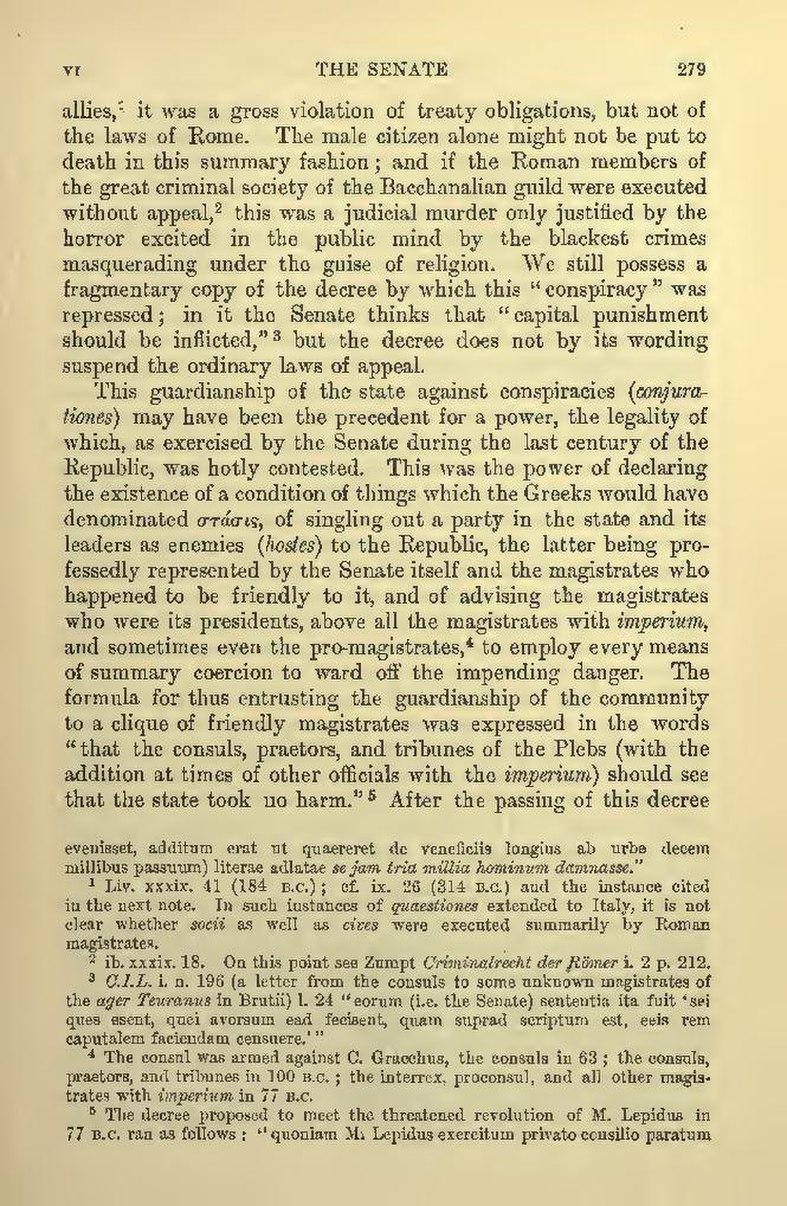allies,[1] it was a gross violation of treaty obligations, but not of the laws of Rome. The male citizen alone might not be put to death in this summary fashion; and if the Roman members of the great criminal society of the Bacchanalian guild were executed without appeal,[2] this was a judicial murder only justified by the horror excited in the public mind by the blackest crimes masquerading under the guise of religion. We still possess a fragmentary copy of the decree by which this "conspiracy" was repressed; in it the Senate thinks that "capital punishment should be inflicted,"[3] but the decree does not by its wording suspend the ordinary laws of appeal.
This guardianship of the state against conspiracies (conjurationes) may have been the precedent for a power, the legality of which, as exercised by the Senate during the last century of the Republic, was hotly contested. This was the power of declaring the existence of a condition of things which the Greeks would have denominated [Greek: stasis], of singling out a party in the state and its leaders as enemies (hostes) to the Republic, the latter being professedly represented by the Senate itself and the magistrates who happened to be friendly to it, and of advising the magistrates who were its presidents, above all the magistrates with imperium, and sometimes even the pro-magistrates,[4] to employ every means of summary coercion to ward off the impending danger. The formula for thus entrusting the guardianship of the community to a clique of friendly magistrates was expressed in the words "that the consuls, praetors, and tribunes of the Plebs (with the addition at times of other officials with the imperium) should see that the state took no harm."[5] After the passing of this decree
- [Footnote: evenisset, additum erat ut quaereret de veneficiis longius ab urbe decem
millibus passuum) literae adlatae se jam tria millia hominum damnasse."]*
- ↑ Liv. xxxix. 41 (184 B.C.); cf. ix. 26 (314 B.C.) and the instance cited in the next note. In such instances of quaestiones extended to Italy, it is not clear whether socii as well as cives were executed summarily by Roman magistrates.
- ↑ ib. xxxix. 18. On this point see Zumpt Criminalrecht der Römer i. 2 p. 212.
- ↑ C.I.L. i. n. 196 (a letter from the consuls to some unknown magistrates of the ager Teuranus in Brutii) l. 24 "eorum (i.e. the Senate) sententia ita fuit 'sei ques esent, quei avorsum ead fecisent, quam suprad scriptum est, eeis rem caputalem faciendam censuere.'"
- ↑ The consul was armed against C. Gracchus, the consuls in 63; the consuls, praetors, and tribunes in 100 B.C.; the interrex, proconsul, and all other magistrates with imperium in 77 B.C.
- ↑ The decree proposed to meet the threatened revolution of M. Lepidus in 77 B.C. ran as follows: "quoniam M. Lepidus exercitum privato consilio paratum
